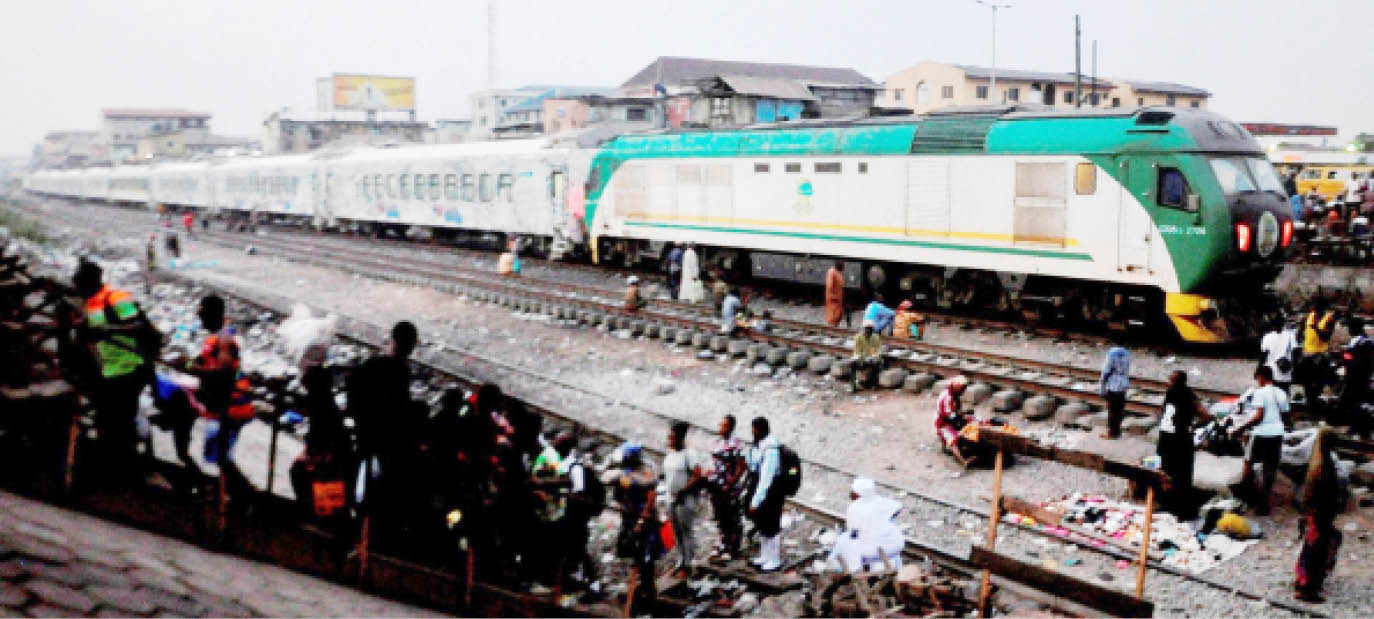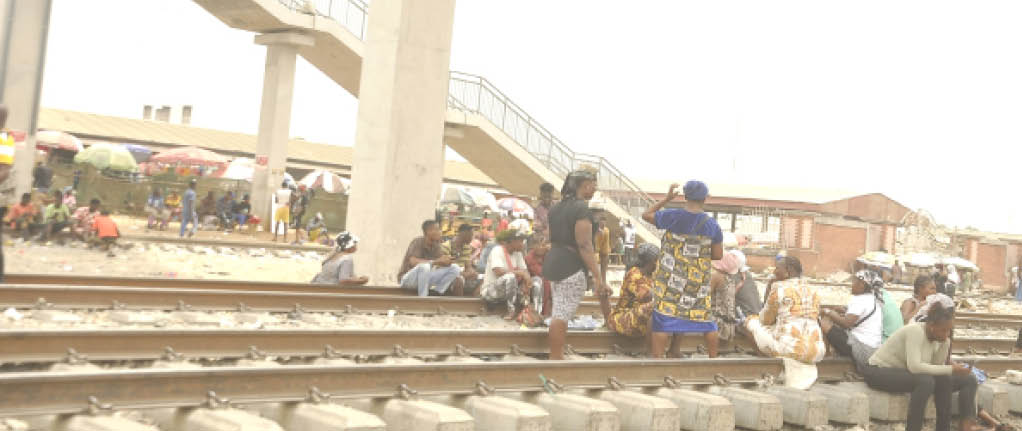‘Why we endanger our lives trading along rail tracks’
In Lagos, Nigeria’s commercial capital, trading on railway tracks is increasingly becoming a pastime, especially in the face of the prevailing economic hardship in the country. But there are safety concerns over these growing commercial activities ahead of the planned launch of the Red Line by the state government. While traders said they were compelled […]

traders along railway tracks in lagos
In Lagos, Nigeria’s commercial capital, trading on railway tracks is increasingly becoming a pastime, especially in the face of the prevailing economic hardship in the country. But there are safety concerns over these growing commercial activities ahead of the planned launch of the Red Line by the state government.
While traders said they were compelled to risk their lives selling on the rail tracks for survival, as well as their inability to rent shops, a transport expert has warned that such practice could result into serious disaster if left unchecked.
Our correspondent who monitored train movement at Agege recently observed that there has been an increase in trading activities, in addition to people sitting on the tracks, especially at night and early in the morning.
Many traders were seen displaying their wares on the tracks, such as clothes, popularly the ones called Okirika, provision items, cosmetics, among others.
FG’s import duty inconsistency hurting economy – MAN, Obi
FG, Access Bank partner on N50bn MSMEs support
For many of the traders, the rail track has become the only shop they could afford, not minding the risk.
As soon as they see an oncoming train, they would quickly pack their goods to allow the locomotive pass and return to the tracks thereafter.
Some of the traders even display their wares on the tracks, not minding the vibration and noise from the moving train.

It would be recalled that the federal government had in 2020 moved against traders and hawkers on railway tracks. This followed the death of two people there.
Although the then minister of transportation, Rotimi Amaechi, had warned that the government would no longer tolerate encroachment on the rail corridors, the trend has continued unabated.
Daily Trust Saturday recalls that in 2022, there was a mild drama when a moving train stopped for a passerby who sat on the rail track along Cappa/Oshodi.
The passerby, according to findings, was sitting desolately on the rail track after he reportedly lost N35,000. He did not vacate the track despite the blistering horn of the train.
To the chagrin of many onlookers, the Lagos-Ibadan bound train waited for the man to leave the track before continuing.
Apart from the endangered traders, passersby and touts who have made the rail tracks their homes, destitute are also not left out in the encroachment.
‘We can’t afford to pay for shops’
Most of the traders who spoke with Daily Trust Saturday said they chose to sell on the rail tracks because they could not afford to pay for shops.
Kingsley Uche, who sells used shoes, known as ‘Akube,’ described selling items on the railway track as brisk business, saying there is high patronage from low income earners who could not afford the cost of boutiques.
“We help the low income earners because not everybody can afford expensive shoes sold in boutiques,” he said.
Uche, who travels 5km daily from the Kola axis, a suburb along the Lagos-Abeokuta expressway to sell in Oju-irin, Agege, explained that he opted to sell on the railway track because he could not afford the cost of renting a shop.
It was also learnt that the traders on railway tracks pay a daily levy to officials of Agege Local Government.
“I pay N300 to N500 daily to secure my spot; and I have been here for five years. I am here because I cannot afford to rent a shop,” he said.
On the risk of selling on the track, he smiled, saying that traders know the specific period trains pass.
Another trader, Okechukwu Ejesieme, agreed with Uche, adding that the police usually help to stop passersby from crossing the track at the sight of incoming trains.
“There is a gate here, whenever the train is coming, the police close the gate to prevent people from passing,” he said.
Ejesieme, who sells used clothes, lamented the country’s poor economy, saying it is affecting the business.
“I am a father of three children. Things are very expensive and our expenditure is higher than income. For a family man to survive in this country, it is by God’s grace,” he said.
Daily Trust Saturday reports that going by the rate of activities on the rail tracks, the Nigerian Railway Corporation (NRC) said train could not move at its expected speed as it had to slow down on approaching Lagos.
The train service designed to move in one hour, 30 minutes to Ibadan now takes two and a half hours due to the snail speed of the train within the Lagos corridor.
The regional district manager for Lagos, Augustine Arisa, an engineer, said the NRC, in collaboration with the taskforce in the state, carried out regular raids to stop any form of encroachment on the rail tracks. He said the Lagos State Government was also doing regular advocacy on it.
“It is something we do on a regular basis. When you send them away today, the following day they still come back. We do it regularly,” he said.
In 2021, the federal government warned Lagosians against turning the railway tracks to marketplace and parking spaces.
Former Minister Amaechi had said the rate at which people displayed their wares on the rail tracks in Lagos was becoming worrisome. Stressing that the practice had made the new standard gauge to look like an old track.
“The accident that happened recently occurred because of the vehicle parked on the narrow gauge rail tracks. I was told by the experts that it takes 800 metres for a train to stop when it’s at full speed. The vehicle was parked there because the occupants were waiting for people to open the Arena shopping complex.
“So because it takes 800 meters for a train to stop when at full speed, the train could not apply brakes when the driver saw the vehicle parked on the rail tracks. That was why the train rammed into the vehicle, and unfortunately, a life was lost.
“The Lagos State governor and I have agreed that the train tracks were neither parking spaces nor a market. Therefore, traders arrested selling along the train tracks will be prosecuted and jailed. We need to stop people encroaching on the rail tracks in Lagos,” he said.
It is a disaster waiting to happen – Professor Badejo
Professor Bamidele Badejo, a former commissioner for transportation in the state, blamed the encroachment on rail track on lack of enforcement, saying the law is very unambiguous about it and nobody is enforcing it.
He tasked the NRC district management and the police to discharge their duties properly in ensuring compliance.
“We also have the local government and various task forces that are supposed to extend their compliance and enforcement mechanism to all those places. If you look at the various agencies of government that are supposed to ensure that those corridors are rid of traders, you wonder why they are looking the other way while daily trading activities are growing and expanding. We are only waiting for a major disaster such as a derailment or an explosion that would lead to massive destruction of lives and property,” he said.
Badejo said the only reason people sold on rail tracks was the absence of community markets, saying government should focus on establishing markets in all the communities to create an avenue for traders to sell their goods.
“It is not like the traders don’t know the danger and consequences of operating their businesses along those rail tracks. Obviously, they are aware; it is a failure on the part of the government, especially local governments. This is because there are no community markets where people can converge to carry out their petty trading,” he added.
